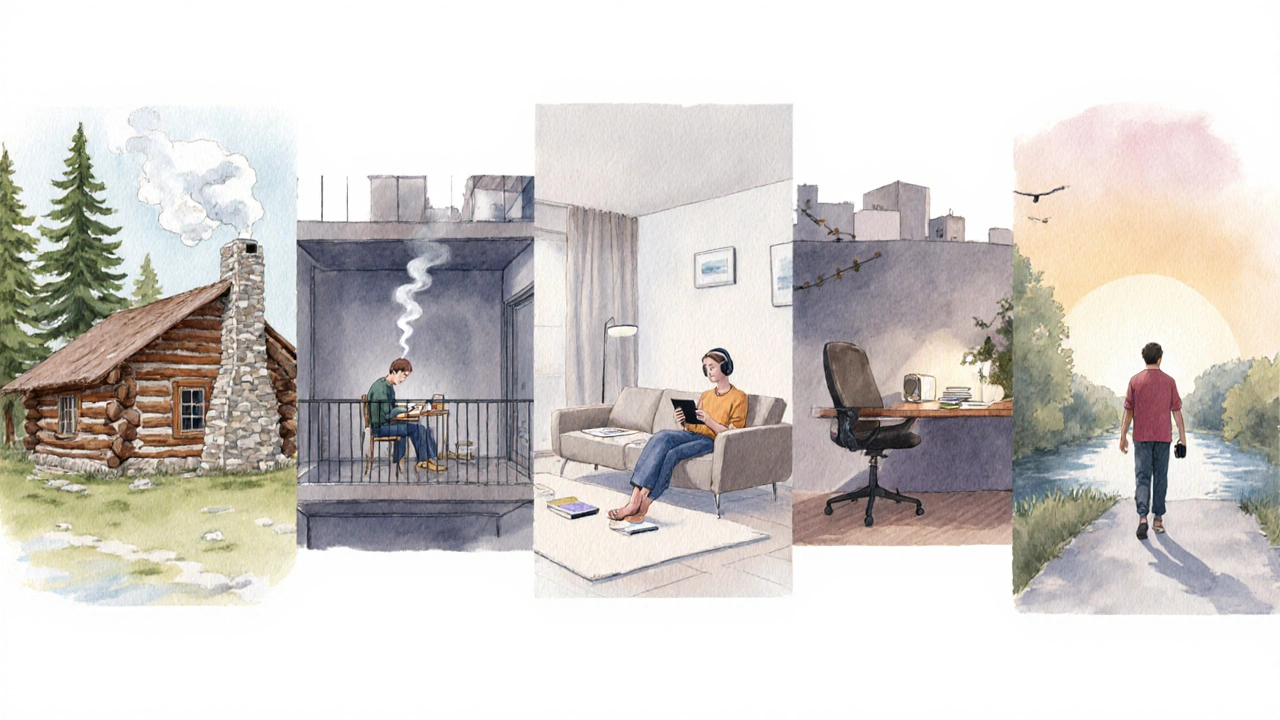Solitude Label Identifier
Answer the questions above and click "Identify Best Term" to see which label fits best.
Ever met a friend who seems happiest with a good book and no background chatter? You might have wondered what to call that person without sounding judgmental. The answer isn’t a one‑size‑fits‑all label - language reflects subtle shades of personality, lifestyle choice, and even cultural bias.
Quick Take
- Loner: prefers solitude, not necessarily antisocial.
- Hermit: lives apart from society, often for spiritual or personal reasons.
- Introvert: gains energy from being alone, but still participates socially.
- Solitary person: a neutral term for anyone who enjoys alone time.
- Recluse: avoids contact deliberately, often due to trauma or distrust.
Defining the Core Terms
Below are the most common labels you’ll encounter, each introduced with a concise definition that can be used in conversation or writing.
Loner is a person who prefers being alone but still maintains normal social ties when needed. A loner might enjoy evenings at home, solo hobbies, or working remotely, yet they can chat comfortably at a party if the mood suits them.
Hermit is someone who deliberately withdraws from society, often living in isolation. Historically, hermits retreat to remote locations for spiritual contemplation; modern hermits might simply choose a cabin in the woods.
Introvert is an individual who restores energy through solitary activities rather than social interaction. Introverts can be outgoing, but large gatherings tend to drain them, prompting a need for recharge time.
Solitary person is a neutral descriptor for anyone who enjoys spending time alone. This phrase avoids the psychological baggage of other labels.
Recluse is a person who actively avoids social contact, often due to past hurt or distrust. Recluses may have limited digital footprints and rarely attend public events.
Side‑by‑Side Comparison
| Term | Typical Lifestyle | Social Interaction | Connotation |
|---|---|---|---|
| Loner | Enjoys alone time, maintains a regular job/social circle | Occasional, comfortable when chosen | Neutral‑positive |
| Hermit | Often lives in a remote setting, limited possessions | Rare, usually by choice | Romantic or spiritual |
| Introvert | Works or studies in typical settings, needs downtime | Selective, may avoid crowds | Psychological, neutral |
| Solitary person | Varies widely, from city dwellers to countryside dwellers | Flexible, depends on mood | Completely neutral |
| Recluse | Often stays indoors, limited external engagements | Minimal, sometimes forced | Negative‑to‑neutral |

Psychology Behind the Preference for Solitude
Research from the American Psychological Association (2023) shows that moderate solitude can boost creativity, lower stress, and improve self‑awareness. Introverts, for instance, tend to process information more deeply, which explains why they might excel in writing or analytical jobs.
However, chronic isolation isn’t the same as a healthy love of being alone. Loneliness- the painful feeling of social disconnection- correlates with higher risks of depression and cardiovascular disease. The key distinction is choice: a loner chooses solitude; a lonelier individual may feel forced into it.
When to Use Each Term
Choosing the right label matters in both casual chat and professional writing. Here are quick guidelines:
- Use loner when you want a neutral, everyday term that acknowledges a preference without judgment.
- Pick hermit for someone who literally lives away from society - think of a mountain cabin dweller.
- Reserve introvert for discussions about personality theory, energy sources, or when referencing the introversion‑extroversion spectrum.
- Apply solitary person when you need a safe, non‑clinical descriptor.
- Reserve recluse for individuals who actively avoid contact, often due to trauma or deep distrust.
Real‑World Examples
Consider these everyday scenarios:
- Maria spends her evenings sketching in her studio and rarely goes to loud parties. Her friends call her a loner, but she’s happy to join a dinner when invited.
- Thomas lives in a small cabin on a Scottish island, only venturing out for supplies. He embodies the classic hermit lifestyle.
- Aisha works as a software engineer and prefers coding alone, yet she thrives in small team stand‑ups. She’s an introvert who balances solitude with brief collaboration.
- Jamal enjoys solitary hikes and reads by the river, but occasionally joins a book club. He’s simply a solitary person.
- Elaine stopped answering calls after a painful breakup and now rarely leaves her apartment. Her avoidance classifies her as a recluse.
How to Talk About Solitude‑Loving People Respectfully
People often misinterpret solitude as social anxiety. To avoid stigma, follow these tips:
- Ask, not assume. "Do you prefer quiet evenings?" is better than "You’re such a loner."
- Focus on the positive: "I admire how you can concentrate for hours."
- Avoid labels that feel derogatory unless the person self‑identifies with them.
- Respect boundaries - some solitary folks cherish privacy more than others.

Frequently Asked Questions
Is it okay to call someone a loner?
Yes, if the person uses the term for themselves or if you use it in a neutral, non‑judgmental way. Always consider the context and tone.
How does introversion differ from being a recluse?
Introversion is a personality trait about energy sources; recluse describes a behavioral pattern of avoiding social contact, often due to fear or past hurt.
Can a hermit still have friends?
Absolutely. Many hermits maintain long‑distance friendships or occasional visits; the key is choosing a lifestyle that limits regular social interaction.
Does loving solitude mean being antisocial?
No. Antisocial behavior involves hostility or disregard for others, while loving solitude is simply a preference for alone time without hostility.
What are healthy ways to enjoy alone time?
Engage in activities that recharge you: reading, journaling, walking, creative hobbies, or mindfulness meditation. Balance solitude with occasional social contact to keep loneliness at bay.

